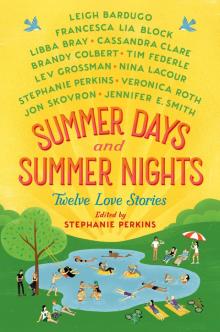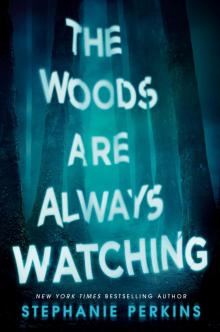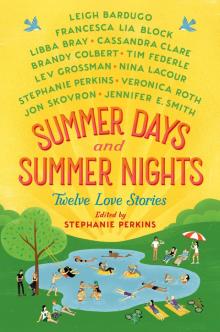- Home
- Stephanie Perkins
Summer Days and Summer Nights: Twelve Love Stories Page 6
Summer Days and Summer Nights: Twelve Love Stories Read online
Page 6
And she stands on her tiptoes and waves her phone in the air, searching for a signal, until I say, “Not now, not now, not tonight.”
The fire is burning down, still hot, but not as grand as before. Mimi pours simmering water into my mug.
“So, how is it?” Travis asks me.
“What?”
“The tea.”
“Be honest,” Mimi says.
“It tastes exactly like mint tea.”
Travis’s eyebrows shoot up in surprise. “Well okay then.”
* * *
It’s too cold to stay up any longer. I take my new toothbrush out of its packaging, untwist the lid of the travel-size toothpaste. I spot Travis coming out of Hope’s tent with a sleeping bag and pillow. “Oh no,” I say. “I’m taking your place?”
“Nah,” he says. “It’s better this way. She’s always trying to get with me.”
“Oh, please,” Hope says. “You’re like my brother.”
He climbs into his bag.
Mimi says, “I’d invite you to stay in my tent, but you’d basically have to sleep on top of me.”
“Girl,” Travis says, “you know I don’t want to listen to you snore all night.”
He zips his bag higher, until only his eyes show.
“Don’t suffocate,” Mimi says. “We’d be lost without you.”
“I promise,” Travis says, and then even his eyes disappear.
“Do you have everything you need?” Mimi asks me.
She’s given me two blankets, and Travis let me scavenge through his car for extra layers. Lucky for me, he’s the kind of boy who smells nice.
I nod.
She says, “I’m so glad I drew you that picture.”
“Me, too,” I say.
“I’ll see you in the morning, right? You aren’t going to change your mind and leave us once we’re all sleeping?”
“No way.”
She touches my wrist. “Well, good night, then.”
We close ourselves into the tent. Once Hope’s in her sleeping bag and I’m in layers of sweaters, the rustle of our movement dies down and all I hear is the night. Wind and crickets. The faraway laughter from another site.
Hope whispers, “My parents got divorced when I was twelve.”
“Oh,” I say. “I’m sorry.”
“It was like the ground was dropping out. It was terrible. I got used to it, but ‘home’ has never felt the same since.”
The top of her tent is clear. I can see the moon and the stars, and her words feel just as vast and true. As much as people want to look on the bright side, skip straight to the future when everything will be okay, the truth is that there is this time, where you sometimes have trouble breathing, and you feel powerless. Like you’re screaming and no one hears you, and the myth of the happy future is nothing you can count on, and the only word that makes sense is escape.
The end of love. The end of family. The end of being a daughter to people who wake up together in bed, leave their toothbrushes in the same little cup, roll their eyes and sigh and maybe hate each other but still come home to the same place each evening and sit at the same table.
“We only have a year,” Hope says. “And then we get new homes that we make for ourselves.”
“Yeah,” I say.
“And, until then, we can camp.”
Hope falls asleep. I lie very still and listen for Mimi’s snores. Her tent is so close, but no sound escapes it. So much time passes that I worry it will get light soon and I won’t have slept at all.
I breathe in.
She drew me a picture.
I breathe out.
She wanted me here.
* * *
“There’s a magic tree,” Mimi says in the morning. “I want to take you there. After breakfast, of course.”
From out of nowhere come sausages and potatoes and eggs, somehow all hot on our plates at the same time, despite having only one pan and an open flame. We eat in silence, sip the coffee Hope makes cup by cup. Morning light streams through the redwoods. The air smells like campfire and earth and ocean, and I don’t have a word for how I feel except maybe alive.
And then Mimi and I are walking to her car and climbing in, just her and me, and I’m touching the crystals she has on her dash: one clear, one pink, one yellow.
“What are these for?” I ask.
“My mom makes me have them in the car at all times. She believes they’ll protect me.”
I don’t have words for this. I can’t imagine having a mother who believes in something like that.
“Good thing they’re pretty, right?” Mimi says, and I nod.
She drives slowly down the dirt road that leads away from camp, stopping to let a small group of children cross. She waits a moment after they’re gone, and soon a little boy comes darting after them. She smiles.
“Had a feeling,” she says. “There’s always a straggler or two.”
When she pulls over ten minutes later, it’s into a turnabout that appears to be completely random. There’s no trailhead, no sign, nothing to indicate that we are anywhere anyone is meant to be. I expect her to say she missed our turn, but instead she turns off the car and looks at me.
“Ready?” she asks, and then we’re darting across the narrow street. She’s leading me up a hill, through trees and ferns, tall grasses and wildflowers. We duck under branches and sidestep blackberry bushes, and then the land levels out into a clearing, and beyond the clearing, right under us, is the ocean.
“This,” Mimi says, “is my favorite place in the entire world.”
She leads me to the magic tree. It’s not a redwood or an oak or a pine or a maple. I’ve never seen anything like it before. It’s old—I can tell—but it isn’t majestic like the redwoods. It’s wider than it is tall, with thick branches that spread far on either side, its trunk covered with knots.
She jumps up onto a welcoming branch, climbs a little higher. I touch the bark and find a place where a tiny green shoot is beginning.
“I have a story to tell you,” I say.
Mimi nods.
She reminds me of Alice in the tree, before she goes to Wonderland. I climb onto a branch and sit with my legs dangling. We could hurl ourselves into the ocean with just one push of our limbs, but it also feels safer, more peaceful, than any place has felt for a very long time.
It feels the way I thought summer school might feel.
“It’s about me and my mom and our house.”
“I want to hear it,” Mimi says.
I feel like I do in Jessica’s office when I’m starting to tell a story and already wondering why I’m telling it. But, as Jessica always says, I have to start somewhere.
“We bought the house when I was in seventh grade,” I say. “And it was something that my mom had wanted really badly for a really long time. We lived in a fine house before that, but it wasn’t a beautiful house, and my mom wanted all of these things, like a front porch and natural light. Room for a garden and nooks and crannies. She loves nooks and crannies. I do, too.”
Mimi smiles. “I’ll remember that.”
“My dad works a lot of weekends, so my mom and I were the ones who went to all the open houses. We looked for months for the right house, and then we found it. It had everything we wanted, and it was on a pretty street lined with oak trees, and it was just a tiny bit more than my parents had wanted to spend. They put a bid on the house, and they got it, and that’s when my mom and I really got started.”
A breeze picks up, and I take a moment to look at the branches sway above us. I try to remember what it felt like back then, back when every day was a day I wanted to spend with my mother.
“We made plans for each room—the paint colors, the furniture arrangements. We held up all the paintings to all of the walls to find the perfect spots for each of them. We made long wish lists of things to buy. We chose wallpaper for the nooks and crannies. I got to pick the paper for under the stairs. I chose this retro pattern, dandelions agai
nst a pink background. We put a little chair and reading table there, and it was my favorite spot in the house for a long time.
“We went to thrift stores to hunt for antiques. We went to auctions to bid on more art. We went to galleries and chain stores and showrooms. I learned about colors and how to mix patterns. I learned about layering textures and caring for houseplants. Every time someone complimented my mother on the house, she said, ‘Flora and I decorated it together.’”
Now they’re just throwing it all away. All of it. As though it never mattered. But I can’t find the words to explain what it means to me. There are tears on my face, and I didn’t even know that I was crying. The end of love. The end of love.
Mimi slides off her branch and climbs up to mine. She takes my hands in her hands, but the gesture isn’t consoling. It’s more than that. “I remember when I first saw you,” she says. “You were this happy, confident girl. And I wished I could yank Blake’s arm away from you, put mine around you instead.”
“I would have liked that.”
“Even then?”
“Couldn’t you tell? I feel so obvious around you. I always have.”
“I knew you felt something.” She lets go of one of my hands and touches my cheek.
I lean my face into her hand. I want her to keep it there forever.
“I wanted to kiss you then, when you were happy. And I want to kiss you now, while you’re sad.”
She just keeps looking at me, though. She doesn’t move.
“I want that, too,” I say. “A lot.”
And then we tilt our faces, lean toward each other.
I am kissing Mimi Park, two years after I met her. I am kissing her even though I often told myself that I would probably never see her again. At night, sometimes, when I was awake and thinking of her, I told myself that maybe we weren’t supposed to be together. Maybe, somehow, I got confused. Just because a person reveals something to you about yourself doesn’t mean they’re meant to do more than that. So just because catching a glimpse of Mimi that first time—and then each time after—made every part of me glow, made me want to press against her, didn’t mean she was the one for me. Maybe all it meant was that I needed something different from what I was getting. I needed a girl.
But I’m three years older than I was then. I’ve kissed a few girls by now. I think I’ve even been in love. But nothing has ever felt like this.
I’m up against the trunk now, her hands on my face, in my hair, along my ribs, and then on the small of my back. I’m holding on to a smaller branch, afraid to let go.
“We’re gonna fall out of this tree,” I murmur, her mouth on my neck.
She pulls away. I want her back. She drops onto the grass, and I drop down after her. The ocean glitters below us. The sky is blue and clear. The tree is still magic. She pulls me down to the earth, and she kisses me again, and again, and I shift my body until she’s under me, her hair against the moss, her eyes open wide, her lips still wet and smiling.
“I don’t feel sad,” I say.
She laughs and says, “Good. That’s good. I don’t, either.”
* * *
“It’s Flora and Mimi,” Travis calls out when we get back, and just that sentence—just our names, joined by and—it floods me with happiness all over again.
“It’s hiking time,” Hope says.
Mimi kicks up her foot. “I only brought my sandals!”
“Oh, please,” Travis says. “It’s not that kind of hike.”
We walk into redwood groves, where it’s almost as dark as night, where the air is so much cooler, and then out of them again, into the sun. We walk cliffside with the ocean crashing below us, wildflowers growing between rocks, and into the tiniest meadow I’ve ever seen, where we sit in a circle to rest.
I discover a cluster of California poppies next to me.
“I would pick you one,” I tell Mimi, “if it wasn’t illegal.”
“Laws are for breaking.” She leans over my lap and snaps a stem, weaves the poppy into my hair.
She looks at me.
“Perfect,” she says, and Hope agrees, but Travis squints and shakes his head.
“She needs a second one for symmetry.”
He plucks another and hands it to Mimi, and I don’t know how I got so lucky, to be here with the three of them. It makes no sense that we would meet again the way we did, in a summer school class, us the only rising seniors in a classroom full of fifteen-year-olds.
“I have a question,” I say.
“Tell us,” Hope says.
“Why—how—are you all in geometry?”
“We’re doomed when it comes to math,” Hope says. “We’ve always been behind.”
Mimi says, “It was the only class we had together last semester. First the teacher separated us because we couldn’t stop talking to each other—”
“No exaggeration,” Travis says. “It was, like, physically impossible for us to stop talking.”
“And then we spent the whole time texting.”
Hope shakes her head. “It was terrible. I tried to ignore my phone, but they kept shooting me meaningful looks. We all got Ds! And now here we are in summer school and we’re all together again.”
Travis says, “It’s our second time through, and none of us are learning anything.”
“You guys,” I say. “What you need to understand is that geometry is the best math.”
Hope laughs. Travis says, “Best and math, used in the same sentence … You’ve lost me.” Mimi runs her hand along her tattoo and smiles.
“It’s the most personal. It relates to our bodies.” I stand up and hold my arms out. “Symmetry. Proportion. You guys know that Leonardo da Vinci drawing, where the man stands like this, and then you also see his limbs like this?” I widen my stance and raise my arms higher.
“Yeah, the naked dude,” Travis says.
“I’m pretty sure most of his dudes were naked,” Mimi says.
“But this one has a circle around him, right?” Hope asks.
“Yes! And a square, too. That drawing is all about geometry. And then there’s all this other natural stuff—like when you throw a rock into water, and the ripples spread out, getting bigger and bigger? And the veins on a leaf. And the pattern of scales on fish. The way you can look at a tree trunk and see how it’s grown. Beehives! Succulents!”
“What I don’t get,” Travis says, “is why they don’t teach us that stuff. It’s like they want us to fail.”
“What I don’t get,” I say, “is that I signed up to take geometry because I thought it would be completely familiar and mundane, but I ended up here instead.”
“That sounds like a compliment,” Mimi says.
“It is.” I sit down again and kiss her, quick and light, right at the corner of her mouth.
“Looks like some new dynamics have been established,” Travis says, raising his eyebrows. “When we get back, I’m gonna go ahead and move my sleeping bag back into Hope’s tent. Last night was fucking freezing.”
* * *
Night is falling again. Hope comes back from her car with a ukulele. Travis disappears into the brush and returns with two fistfuls of leaves.
“I’m making tea,” he says. “A very special blend. Mint and some other stuff.”
“Is it going to kill us?” Mimi asks.
“Oh, come on,” he says. “Nobody has ever died from tea.”
I don’t take a single sip, but it warms my hands as the air grows cooler.
“In honor of you, Flora, I’m singing exclusively love songs tonight,” Hope says.
Mimi heats up minestrone over the campfire and divides it among four bowls. Every move she makes is enchanting. A drop of soup splashes on her thumb, and she sucks it off. She hands me a bowl, and our fingers touch.
She doesn’t say much, but she’s still telling me things. She’s saying that yes, there are Januarys, and the terrible things people do to each other when they are no longer in love. She’s telling me t
hat the end of love is a fine phrase to ponder, but it’s a poor choice for a tattoo. Because just as there are Post-its and red condominium doors, there are also tree branches and coastlines. There are sleeping bags and tents and pinpricks of stars, there are people like her, there is the person I’m becoming.
I’m going to have to drive home tomorrow. Maybe my parents will yell at me for going away like this. Maybe they’ll smile and ask if it was fun. Either way will hurt.
In two weeks, our house will be empty. And then the stagers will descend with the trucks full of no one’s furniture and art and try to make it look like a different family lived there, an imaginary family with no photographs or mail or food in their refrigerator. In real life, we were sometimes messy. We didn’t always do the dishes. We left pots soaking. We let the papers pile up, and left too many pairs of shoes by the door, and didn’t vacuum as much as we should have.
We were not always happy, but we were always us.
Tomorrow I’ll walk in and we won’t be us anymore, we’ll be different people; we won’t belong in the way we did before. I don’t know what to do with that yet, but I know that it’s true.
Hope’s singing another love song, though, just as she promised. She strums a little clumsily, but her voice is clear and sweet, and she knows all the songs by heart. When she finishes, she announces that she’s going to bed, and soon after, she and Travis disappear.
Mimi leans in close. I can smell mint on her breath—not like toothpaste or gum, like something real that’s from the earth—and then her lips are on my ear and she’s whispering, “I don’t really snore.”
I’m smiling.
Our heads pivot, until it’s my mouth against her ear, and I say, “I know.”
We’re alone by the fire now, and the wind is picking up, and she takes my hand, and we walk together to her tent. I can hear everything: The pounding of my pulse. The crunch underneath our feet. The rustle of her clothes when she bends over to reach the tent’s zipper. And then it begins: the sound of unzipping, from the ground on one side, and up, and up, and down again. I close my eyes even though it’s already dark, because of this sound. It’s like my life opening up.
And then it stops.
And we climb in.

 Summer Days and Summer Nights: Twelve Love Stories
Summer Days and Summer Nights: Twelve Love Stories Anna and the French Kiss
Anna and the French Kiss Lola and the Boy Next Door
Lola and the Boy Next Door There's Someone Inside Your House
There's Someone Inside Your House Isla and the Happily Ever After
Isla and the Happily Ever After The Woods Are Always Watching
The Woods Are Always Watching Summer Days and Summer Nights
Summer Days and Summer Nights